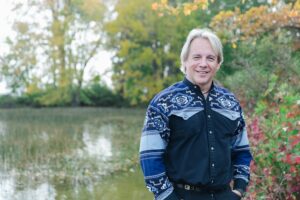Trent University to present honourary degrees to distinguished Indigenous recipients at upcoming convocation

By Walter Quinlan
PETERBOROUGH— At Convocation ceremonies this June 7, Trent University will award honourary degrees to Drew Hayden Taylor (Curve Lake First Nation) and Master Warrant Officer Moogly J.J.E.G. Tetrault-Hamel (Abenaki First Nation).
Master Warrant Officer Moogly Tetrault-Hamel will receive an honourary doctorate of laws in recognition of his 21 years of distinguished military service and his robust Indigenous advocacy and awareness training within the Canadian Armed Forces and the Department of National Defence. He was previously awarded the Queen’s Diamond Jubilee Medal (2013) and the Order of Military Merit (2022).
Drew Hayden Taylor, an award-winning author of over 20 plays and 34 books and the first Indigenous scriptwriter in Canada (“The Beachcombers”), will receive an honorary doctorate of letters.
“A traditional storyteller once told me that ‘We need new stories as much as the old ones,'” Drew said. “That gave me the license to go out and imagine.”
“I pay attention to the world,” he added. “It provides me with ideas and ways to tell a story that are easy to embrace… That’s what I tell people I do for a living – I imagine, and I tell stories… I know what a good story is.”
The story of Indigenous Studies at Trent begins with a cup of tea.
Harvey McCue (Waubageshig) is from the Chippewas of Georgina Island First Nation. He is a respected educator, advocate for Indigenous youth, and a member of the Order of Canada.
In the fall of 1967, when he was in his second year at Trent, Harvey was asked to meet with the university’s president, Dr. Thomas H.B. Symons.
“I was quite anxious to know why I had received an invitation to see him,” he recalled.
Dr. Symons shared with Harvey his longstanding interest, in the language of the day, in Native peoples. Now, as a university president, he wanted to act on it.
“What should I do?” asked President Symons.
“I was just a kid,” Harvey said. “I was absolutely floored by the question.”
But, at that moment, he recalled something he’d recently learned: in 1964, only 160 Indigenous people had attended university in Canada. Harvey told Dr. Symons that increasing the number of Indigenous students at Trent would be a good objective.
They met again that fall and agreed on a concept of an academic program that would focus on First Nations topics and encourage First Nations students to come to Trent.
President Symons was true to his word. By June 1969, a working committee, including Harvey, began turning the concept into reality.
That September, Trent’s Indian Eskimo Studies Program began with 28 students enrolled in one course. By 1972, there were over 300 students, Indigenous and non-Indigenous, in the first-year program of the Department of Native Studies.
These were exciting times.
“President Symons told me to ‘Keep a suitcase by the door,'” Harvey recalled, and he travelled to high schools throughout Ontario to share the news about Native Studies at Trent.
There was also a deliberate effort to hire Indigenous faculty: educators who brought their experiences, knowledge, and messages to the classroom. Harvey was a part of this group and taught at Trent for 14 years.
“Our initial objective was to inform and educate all students about the social and political issues that were part of the Indigenous experience in Canada,” said Harvey; it was a new approach President Symons supported from day one, with funding written into the university’s budget.
Trent University is on the homelands of the Mississaugi Anishinaabe, and it’s the home of the Chanie Wenjack School of Indigenous Studies.
“We wanted to focus on the flight of Chanie to safety,” said Professor David Newhouse (Onondaga), Chair of Indigenous Studies. “For the last 50 years, Trent has created a place of safety where Indigenous knowledge and people are respected.”
Along with academic work, there are opportunities for students to experience life in a community, engage in ceremony, and reconnect with original teachings.
“There’s a sense that we’re helping Indigenous knowledge to come alive in people’s lives,” said Professor Newhouse.
Harvey is glad that today, students in schools across Canada are gaining a deeper understanding of Indigenous knowledge.
“People have asked me: ‘Why is it important for you to know who you are, and why is it important for me, as a non-Indigenous person, to know who you are?'” he explained. “My answer is always the same: our people grew up on this land and we understand this land better than other people. If there’s a solution to the issues coming generations face, our knowledge will be an important guidepost when solving those issues.”
An education grounded in knowledge prepares Indigenous graduates for their future.
“Having a strong sense of self, knowing who you are, is critical for survival,” he said. “Anyone with a strong sense of self – there’s no holding them back, and I believe Trent contributes to that.”
Drew, who never attended university, looks forward to meeting the students at Convocation.
“We’re both heading down that same stream of life,” Drew said. “My education comes from experience and writing, theirs come from a different source. But it’s all learning, experience, and sharing.”


